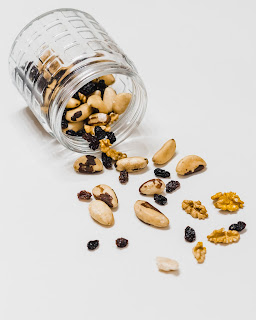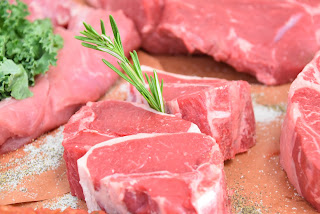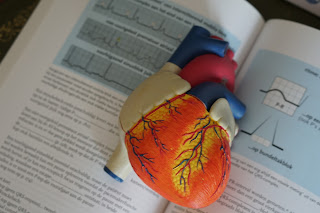How much selenium is in Brazil nuts? The understanding nutrients series
Hi everyone! We’re back with this month’s edition of the
understanding nutrients series. I started this series to give you an understanding
of the essential nutrients in our food that we need for our body to function.
This time we’re looking at the trace mineral selenium. A
trace mineral means we need it in a small amount, but this doesn’t mean it’s
not important!
Roles of selenium:
Selenium has many roles in the body, so I’ll touch on a few.
It’s important to know that selenium joins with proteins to form
selenoproteins, which then go on to perform different functions.
Immune system: selenoproteins play a key part in the immune
system. They help with the functioning and growth of different immune cells,
including the natural killer cells that destroy any infected/diseased cells in
your body. Selenoproteins also help the specialisation of T helper cells that
send signals to the rest of your immune system and let them know they need to
fight an infection. Finally, selenium helps to maintain your antibodies. Antibodies
are what recognise the foreign cells in your body i.e. bacteria or a virus and
then trigger an immune response.
Antioxidant: selenoproteins help regulate oxidation and
reduce the damage caused by free radicals. Free radicals are naturally
occurring byproducts of the body’s reactions and when they build up, they can
harm your cells.
Thyroid: interestingly, the thyroid has the most amount of
selenium present compared to all the other organs in your body. This is because
selenium helps in the creation of thyroid hormones. Your thyroid hormones play
a huge role in your metabolism and the rate at which you use energy.
DNA repair: selenium has been shown to reduce DNA damage.
The research is still being done, but there’s also a suggestion that people
with higher intakes of selenium have a lower risk of cancer. Cancer happens
when cells grow uncontrollably and can be due to a DNA mutation or DNA damage.
So, as selenium can reduce DNA damage it can play a role in cancer development.
Now that we know how essential selenium is, how much do we
need to be eating?
How much selenium do we need?
Adult men need 75ug (micrograms) of selenium a day, while
adult women need 60ug. If you’re lactating, you’ll need an additional 15ug a
day.
Just over half of the selenium you eat is actually absorbed and
utilised by the body. But you can get all the selenium you need from a healthy
balanced diet.
Sources of selenium:
Nuts, meat, wholegrains, and mushrooms are good sources of
selenium. The following isn’t an exhaustive list, but to give you an idea.
- 25g of Brazil nuts (4-5 nuts) has 64ug
- 25g of cashew nuts (a small handful) has 8.5ug
- 100g of sliced pork has 15ug
- 100g of sliced beef has 8ug
- 100g of wholemeal spaghetti has 6ug
- 2 slices of brown bread have 4ug
- 80g of white mushrooms has 13ug
- 2 poached eggs have 28ug
What happens if we don’t get enough selenium?
Selenium deficiency is rare and tends to occur if you’re not
consuming enough selenium from your diet. It also doesn’t typically occur just
in individual people, rather it will present in a group of people that live
near each other. This is because selenium is found in soil, and plants uptake
selenium from the soil. We then eat these plants that contain selenium.
So, if you obtain food from an area with selenium deficient
soil, then you could be at risk of deficiency. This is managed by adding selenium rich
fertilisers to the soil. Or by feeding cattle/chicken selenium rich food and
then when you eat them, there’ll be higher levels of selenium present.
Symptoms of selenium deficiency include: nausea, vomiting,
headaches, confusion, lethargy, a weakened immune system, and seizures. It can
also affect your thyroid due to selenium’s role with the enzymes that regulate
thyroid function. This could lead to overactive or underactive thyroid.
Extreme selenium deficiency can lead to Keshan disease or
Kashin-Beck disease. Keshan disease is a heart disease that can lead to heart
failure and abnormal rhythms. Kashin-Beck disease is a form of osteoarthritis
and leads to the deformity of the bones and joints.
It's treated with supplementation, and/or increasing your dietary selenium intake.
As you can see from reading this post, selenium is a crucial
nutrient in the body. It’s needed in small amounts but it’s mighty.
You can read all the other vitamins and minerals I've covered here.
Key points:
- Selenium has roles in your immune system, thyroid gland, and DNA synthesis.
- Men need 75ug of selenium a day while women need 60ug.
- Meat, nuts, and wholegrains are good sources of selenium.
- A deficiency in selenium is rare but can occur if the soil your food is grown in is low in selenium. It can lead to diseases like Kashin-Beck or Keshan disease.
I hope you enjoyed this blog post!
Bye for now 👋
References:
Brazil nuts: https://pubmed.ncbi.nlm.nih.gov/28888463/
https://quadram.ac.uk/UKfoodcomposition/
Selenium deficiency: https://www.ncbi.nlm.nih.gov/books/NBK482260/
Immune system: https://www.ncbi.nlm.nih.gov/pmc/articles/PMC7019735/
Thyroid: https://www.ncbi.nlm.nih.gov/pmc/articles/PMC5307254/

.jpg)


.jpg)

Comments
Post a Comment